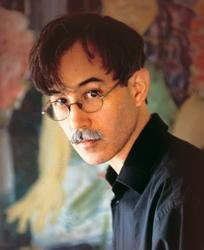 |
| Gordon Dahlquist |
Gordon Dahlquist is a novelist and playwright. His most recent novel is The Different Girl; his other works include The Glass Books of the Dream Eaters, The Dark Volume, and Chemickal Marriage. He lives in New York.
Q: How did you come up with
the idea for The Different Girl?
A: I began the story some
years ago as the libretto for an opera, the music for which would be written by
a composer friend in Oakland. I didn't have the entire story worked out, but
certainly the sparse circumstances on the island – the two caretakers, the four
girls (and their chorus of voices) – were derived from the (mostly financial)
constraints of theatre.
But I was only a few chapters in when that project got
side–tracked pretty early on by another book, which turned out to be The Glass
Books of the Dream Eaters, which took over my life for a few years. Eventually
I came back to The Different Girl and finished it fairly quickly, in a few
months.
The impulse for the book came
less from the story itself than from the narrative voice, and the constraints
that come with it. The book hews very much to what Veronika experiences, her
particular thought processes, and her conclusions – which is to say she's
becomes something of an unreliable narrator, not out of any malice, but simply
because her perspective is, at least at the start, fairly limited.
Interestingly,
May, the character that cracks open Veronika's world, carries her own fairly
limited perspective – it just happens to not overlap with Veronika's at all, so
finding common ground is something of a challenge.
For me, being true to those
constraints – not cheating and having someone find a newspaper that explains
everything – was the core of the book, because it makes the book not finally
about what happens – the plot – but about the characters, and their emotional
evolution.
Q: Do you consider the book
to be science fiction, and why or why not?
A: The book is totally
science fiction, even if it takes some time to really reveal what that means. That
said, I'd say it works in two different ways – which perhaps touches on two
strains of science fiction. One is simply exploring ideas of cognition and
identity, in very much a classic science fictional manner. The other is more
social, and floats around the edges of the story, and speaks to the role of
science in society now.
I'm extremely concerned about the anti–science culture
that's risen in the United States, recently, specifically related to topics
like climate science and evolution. I personally find this to be an extremely
dangerous phenomenon, and there's certainly an element to the book – again,
very much around the edges – that touches on the consequences of this kind of
mindset.
Q: What age group do you
think would enjoy the book?
A: Honestly, I didn't write
the book for any particular age – I wrote it for me. The voice of the narrator
– her age, her vocabulary, her diction – are established at the beginning, and read
as a fairly young person. Likewise, the questions at play are very basic issues
of identity and character – who are we, what defines us, what separates us from
other people, what responsibilities do we have to have to others. These are
classic teenage questions, but they're also simply human questions. My hope is
that readers of any age will appreciate the book.
Q: How much of a departure is
The Different Girl from your previous books?
A: It's very much a
departure. My previous books have been long and complicated adventure stories
with a fair amount of adult content. The Different Girl is a much simpler,
almost fable–like story, with everything happening on a much smaller, more
intimate scale – and something anyone could read. The earlier books dabble in
science fiction, but more with a steam–punk/alchemical edge, while The
Different Girl speaks more to a classic '70s sort of science fiction.
Q: As someone who writes both
plays and novels, do you prefer one to the other?
A: I like them both, and by
now both feed each other. Certainly my novels are greatly influenced by writing
– much of the stories move forward through dialogue, and the action is very
much rooted in a concrete sense of place, almost like what happens is blocked
out for the stage.
More than anything, I think they serve different impulses in
my writing. A novel will have a broader social canvas in terms actual plot, but
also perhaps a more introspective one, with more time spent within a character’s
thoughts. A play is necessarily more social, a world created through conversation,
where what isn't said is more interesting than what is.
In many ways it seems
like for novels one gets the whole paint box, while for plays one gets charcoal
– neither is better, but different ideas are suited to each.
Q: What are you working on
now?
A: I've just finished a draft
of a new novel presently called Second Skin, which isn't a sequel to The
Different Girl – it doesn't deal with any of those characters – but takes place
elsewhere in the same world. The Different Girl raises a lot of questions that
aren't answered – because those characters aren't in any place to get all those
answers – and so the new book allows me to show a much broader view of that
society, from the slagheaps of poverty and environmental contamination, to
enclaves of wealth and technology.
--Interview with Deborah Kalb


No comments:
Post a Comment